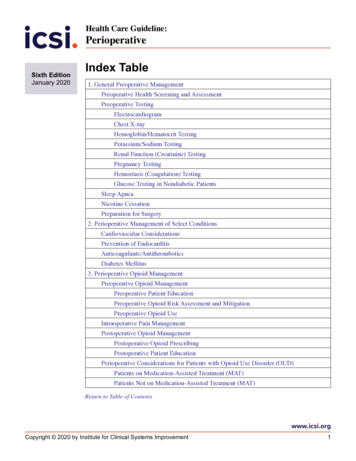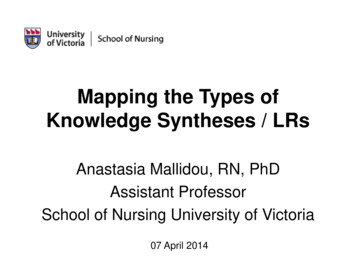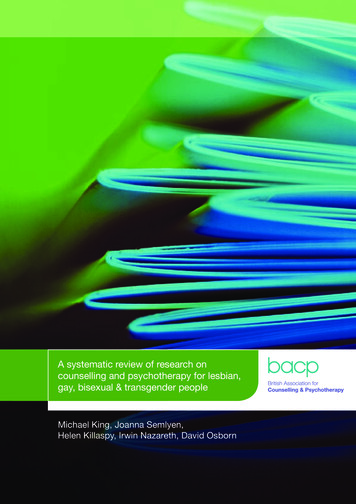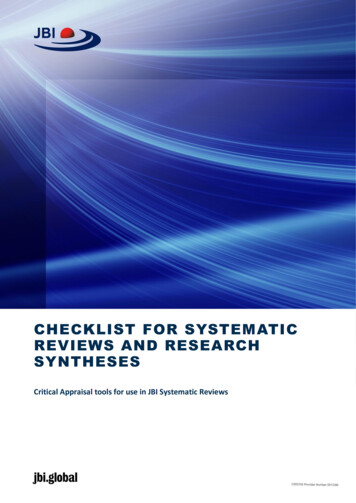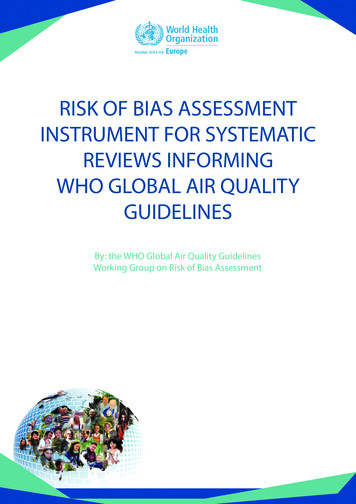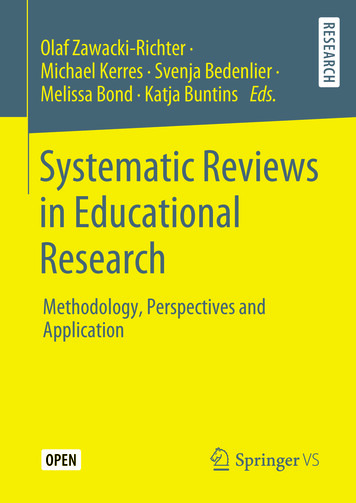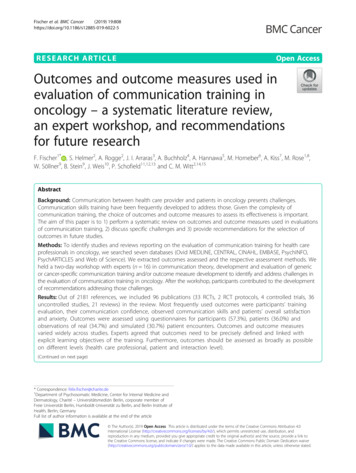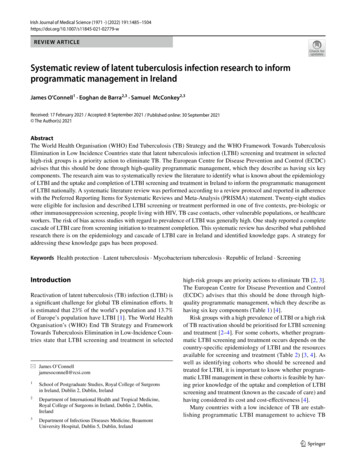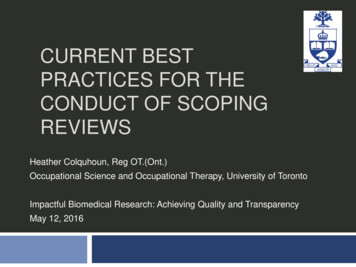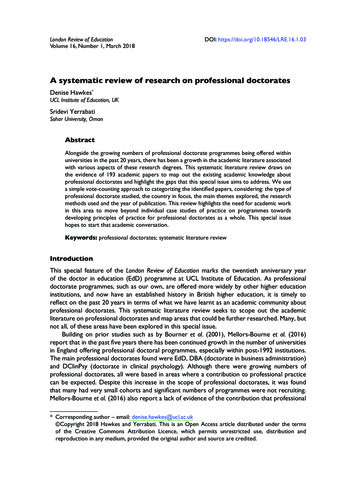
Transcription
London Review of Education Volume 16, Number 1, March 2018DOI: https://doi.org/10.18546/LRE.16.1.03A systematic review of research on professional doctoratesDenise Hawkes*UCL Institute of Education, UKSridevi YerrabatiSohar University, OmanAbstractAlongside the growing numbers of professional doctorate programmes being offered withinuniversities in the past 20 years, there has been a growth in the academic literature associatedwith various aspects of these research degrees. This systematic literature review draws onthe evidence of 193 academic papers to map out the existing academic knowledge aboutprofessional doctorates and highlight the gaps that this special issue aims to address. We usea simple vote-counting approach to categorizing the identified papers, considering: the type ofprofessional doctorate studied, the country in focus, the main themes explored, the researchmethods used and the year of publication. This review highlights the need for academic workin this area to move beyond individual case studies of practice on programmes towardsdeveloping principles of practice for professional doctorates as a whole. This special issuehopes to start that academic conversation.Keywords: professional doctorates; systematic literature reviewIntroductionThis special feature of the London Review of Education marks the twentieth anniversary yearof the doctor in education (EdD) programme at UCL Institute of Education. As professionaldoctorate programmes, such as our own, are offered more widely by other higher educationinstitutions, and now have an established history in British higher education, it is timely toreflect on the past 20 years in terms of what we have learnt as an academic community aboutprofessional doctorates. This systematic literature review seeks to scope out the academicliterature on professional doctorates and map areas that could be further researched. Many, butnot all, of these areas have been explored in this special issue.Building on prior studies such as by Bourner et al. (2001), Mellors-Bourne et al. (2016)report that in the past five years there has been continued growth in the number of universitiesin England offering professional doctoral programmes, especially within post-1992 institutions.The main professional doctorates found were EdD, DBA (doctorate in business administration)and DClinPsy (doctorate in clinical psychology). Although there were growing numbers ofprofessional doctorates, all were based in areas where a contribution to professional practicecan be expected. Despite this increase in the scope of professional doctorates, it was foundthat many had very small cohorts and significant numbers of programmes were not recruiting.Mellors-Bourne et al. (2016) also report a lack of evidence of the contribution that professional* Corresponding author – email: denise.hawkes@ucl.ac.uk Copyright 2018 Hawkes and Yerrabati. This is an Open Access article distributed under the termsof the Creative Commons Attribution Licence, which permits unrestricted use, distribution andreproduction in any medium, provided the original author and source are credited.
London Review of Education 11doctorates make, as well as flagging concern about the perceived difference in quality betweenthese and the PhD. Alongside the growing number of professional doctorate programmes beingoffered within universities worldwide in the past 20 years, there has been a growth in theacademic literature associated with various aspects of these research degrees. Mellors-Bourneet al. (2016) focus on the programmes offered and counting the numbers of students thereon,as was the brief provided by the funder, the Higher Education Funding Council for England(HEFCE).This systematic review will seek to take a broader approach to the literature review thanthis report, and seek to explore the academic literature to identify gaps in the knowledge onprofessional doctorates and propose potential areas for future research. This is undertaken bymapping the development in the academic literature since the seminal book by Scott et al. (2004)attempted to start the academic discussion about professional doctorates and their emergingpedagogy. This systematic literature review draws on the evidence of 193 academic papers tomap the existing academic knowledge about professional doctorates and to highlight the gapsthat this special issue aims to address. A list of the 193 papers is provided in the Appendix.MethodologyOur search for this study involved a systematic review of studies of professional doctorates.Similar to earlier studies on meta-analysis by Yerrabati and Hawkes (2014, 2015, 2016), thereview stages used in this study were informed by the guidelines set by three sources: Campbelland Cochrane Collaboration guidelines on systematic reviews in health care and social policy(Higgins and Green, 2011); Centre for Reviews and Dissemination (CRD, 2009); and Evidencefor Policy and Practice Information and Coordinating Centre (EPPI-Centre, 2010) at UCLInstitute of Education.We started our search by using a list of pre-established search criteria to identify all studiesin the English language on professional doctorates. We did this in two stages: the first stageinvolved identifying relevant databases to uncover both published and unpublished studies; thesecond stage involved listing keywords for the search. Keywords such as professional doctorate,doctorate, EdD and education doctorate were used in our search in addition to the list ofindividual professional doctorates. The list of professional doctoral programmes was drawnfrom the Mellors-Bourne et al. (2016) report for HEFCE on professional doctorates (MellorsBourne et al. 2016: 10, Table 2). Full names and acronyms were used in the search, for example‘EdD’ and ‘doctor in education’.In hindsight, this selection of search terms based on Mellors-Bourne et al. (2016) may haveled to the exclusion of literature that does not use UK programme names. For example, in theUSA, education professional doctorates are commonly referred to as education doctorates.This could have led to the exclusion of important works, and therefore a robustness checkwas undertaken to extend the search terms to include ‘education doctorates’. This robustnesscheck suggested one more theme could have been identified if this had been included, that is thedebate about the relative status of the professional doctorates and the PhD. Therefore, withinthe results below we may have under-reported the literature from the USA and focused on thisdebate. Given the nature of the systematic literature review approach, we have not extendedthe analysis to include this omitted field, to avoid narrative review bias. However, we note thatthis area of the literature may be under-reported in the results below.For published studies, we used the following databases: EBSCO host, Science Direct, Webof Knowledge, Emerald, Age, Taylor and Francis, and Wiley Online. In addition to these, forunpublished studies or grey literature, Google Scholar was used. We searched all of these
12 Denise Hawkes and Sridevi Yerrabatidatabases, using the predefined list of keywords for professional doctorates, in the title, abstract,text and keywords. While the date of publication for the search was left open, only studiespublished in the English language were included. In total, 61,776 studies were obtained fromvarious databases, as follows: Google Scholar (94), EBSC Host (1,489), Science Direct (8,346),Web of Knowledge (1,077), Emerald (93), Sage (738), Taylor and Francis (49,554) and WileyOnline (385). After reading the title and abstract of the studies, as well as eliminating duplicates,193 studies were identified as being focused on professional doctorates.These 193 studies were then categorized using a simple vote-counting approach, mentionedbriefly in Gough et al. (2017). While there is some criticism of this approach for looking atquantitative data, where vote counting is used to look at the number of positive and negativenumbers found, this approach is considered appropriate for this systematic review as the datagenerated was from qualitative data. In this study, we provide the frequency counts (simple votecounting approach) to categorizing the identified papers, considering: the type of professionaldoctorate studied, the country in focus, the main themes explored, the research methods usedand the year of publication. These groups were drawn on based on the type of studies identifiedand the content of those studies. Most of the studies identified were programme or institutionalcase studies providing a broad range of information.ResultsType of professional doctorates studiedMellors-Bourne et al. (2016) identified the main ‘brands’ for professional doctorates in terms ofthe number of students on programmes. These programmes were the doctorate of education(EdD), doctorate in business administration (DBA) and doctorate in clinical psychology(DClinPsy). The first grouping considered for the 193 papers identified was which professionaldoctorate the papers studied. Table 1 presents the distribution of the literature by the type ofprofessional doctorate explored.Table 1: Distribution of the literature by type of professional doctorateTypes of professionaldoctorate studiedFrequencyPercentage (%)Prof doc (professional doctorate)6232EdD (doctor in education)7639DBA (doctor in businessadministration)105DNP (doctor in nursing)137DSW (doctor in social work)94Practice-based doctorates74Other professional doctorates169Total193100Of the main brands identified by Mellors-Bourne et al. (2016), the EdD is the most studied. TheEdD is the main focus in 39 per cent of the papers, and also the true main focus of most of thepapers that are labelled as ‘Prof doc’ (professional doctorates). In total, more than 60 per centof the papers found focused their study on the EdD. For the other brands, the literature is lessdeveloped. The DBA is little studied, with only 5 per cent of the field, and nothing was found
London Review of Education 13regarding the DClinPsy. The focus in the literature on the EdD is unsurprising, given that highereducation research is most strongly associated within education departments and faculties, andit is in these departments and faculties that EdD programmes have their home.In this special issue, we had hoped to move beyond the case studies of individual EdDprogrammes to draw broader links between professional doctorates. Despite our best effortsin approaching potential authors with knowledge of other professional doctorates, this specialedition yet again is largely drawn from those with a focus on the EdD. This suggests that at thistime, to generalize about professional doctorates could be difficult because of the dominance inthe literature on the EdD. However, given the number of papers using case studies on the EdD,it may be possible to start to build more general principles for doctorates in education. Morecase studies on other types of professional doctorates could be fruitful, especially for the othertwo key brands, the DBA and DClinPsy. This is our first identified gap in the literature.Country of professional doctorates studiedWhile PhD programmes are found worldwide, professional doctorates are found in a narrowergroup of countries. In terms of the literature, this pattern of a smaller group of countries isalso found. The country in which the study of the professional doctorates was undertaken ispresented in Table 2. This is the second grouping considered for the 193 papers identified onprofessional doctorates.Table 2: Distribution of the literature by country of studyCountryFrequencyPercentage e literature is largely dominated by papers based in three countries: the USA (44 per cent),the UK (31 per cent) and Australia (17 per cent). Very little has been written outside thesethree countries, and these are the same three countries in which professional doctorates aremost dominant. The growth in professional doctoral programmes in English higher educationinstitutions found by Mellors-Bourne et al. (2016) has not been repeated worldwide. Whilerecent years have seen the development of professional doctorates in East Asia, the dominanceof the PhD globally has been largely unbeatable. Mellors-Bourne et al. (2016) refer to this interms of the perceived quality difference between professional doctorates and PhDs.This special issue has encouraged papers from outside the usual areas of study: the UK,the USA and Australia. Papers are included herein considering international students’ views,with contributions from international students from Israel, India and Ireland. In addition, onecontribution from an author in Singapore has been included. This is clearly an importantdimension of study to explore, even for EdD programmes. This would enable the developmentof more general principles of professional doctorates with more worldwide appeal. Clearlythere is still scope to explore the development of professional doctorate programmes outsidethe UK, the USA and Australia.
14 Denise Hawkes and Sridevi YerrabatiThemes studiedOur third grouping concerns the aspects of professional doctorates that have been considered inthe individual papers. This grouping helps us to identify which aspects of professional doctoratesare less well investigated, as well as those where the literature has a broad consensus. Much ofthe literature identified follows a case study research design. Such papers often report what wedo on our programme and why it is considered valuable. This leads to a wide diversity in thematerial covered within individual papers. As this research design encourages the explorationof many themes, those identified within each paper have been arranged in four main groups, asset out in Table 3.Table 3: Distribution of the literature by theme exploredCountryValue of professional doctorate to institutionFaculty reflectionFaculty viewPolicyProgramme contentOverview of professional doctoratesOverview of local programmeAssessing the programmePedagogyCurriculumRequirements of programmeQuality assurancePractical relevanceResearch degree hical issuesAttrition, retention and completionStudent experienceSupporting students/mentoringStudent experienceStudent perceptionStudent motivationStudent attitudeStudent trainingStudent challengesStudent learningStudent engagementStudent 8216113154612624211510377Percentage ofliterature (%)655930100
London Review of Education 15The first panel presents the proportion of the literature and subgroups within the group thatconsiders the value of professional doctorate programmes to the institution. This topic covers6 per cent of the literature. As found by Mellors-Bourne et al. (2016), we did not identify anyacademic literature on the wider effect of professional doctorates, beyond the impact on eitherthe individual and/or the institution. Much is claimed in terms of anecdotal evidence of thewider impact on professional practice of professional doctorates, but nothing more than that isfound in the academic literature. The search did attempt to include theses, professional papersand other grey literature, but it is possible that any work on the wider impact in professionalpublications that is published there is under-reported, given the nature of the search terms anddatabases used. This is clearly an important gap in the academic literature, and one we hope toaddress in future research.The second panel presents the proportion of the literature and subgroups that considerprofessional doctorate programme content. This topic covers 55 per cent of the literatureand is the largest aspect of the published work. Within this theme, overviews of professionaldoctorates (both in general as a group or in terms of local programmes offered) are the maincontent in the field. This is largely the focus of the older literature, which dedicates a lot of casestudy time to highlighting the innovative design of these programmes, often in relation to thePhD. The more contemporary literature focuses on the curriculum development of professionaldoctorates and their practical relevance. This aspect of the literature is very well developed,and largely focuses on the EdD. Over time, a focus on research methods and professionalismas the core content for a doctorate in education become largely agreed upon in the literature.The practical relevance is often used to motivate this focus on professionalism and researchmethods, as well as being used to signal the unique contribution of professional doctorates.However, this practical relevance is less well developed in the literature, often reported throughanecdote and the views of programme leaders. This links to Mellors-Bourne et al.’s (2016) callfor more research on the practical relevance of professional doctorates.The third panel records that 9 per cent of the literature considers the research degreeaspects of professional doctorates. Issues around supervision, thesis development andcompletion rates are much more widely studied for PhD programmes than for professionaldoctorates. While the focus on the curriculum of the taught aspects of the programme have ledto a general consensus on what to offer in the early stages of an EdD programme, the lack ofresearch on the research stage gives scope for further research on aspects of the professionaldoctorates focused on supervisor and thesis issues. Research by Hawkes (2017) attempts tostart this conversation, building on Hawkes and Taylor (2016), by considering the resourcesdeveloped online to support EdD students at the thesis stage.The fourth and final panel explores the second-largest theme in the literature, which relatedto the student experience. This is unsurprising, given the focus on the EdD and the origin of manypapers from education researchers. The student experience is often reported as positive, andthe findings largely suggest that students welcome the structure of the professional doctorateprogramme, the cohort of students they are based within and the focus on a problem of practicein their research. This broad consensus in the literature on EdDs could be extended to considerother professional doctorates, and is an identified gap in the field. Storey (2013, 2016) attemptsto explore in more detail the value of the EdD cohort, applying a critical friends approach. Thiswork shows the scope for considering the benefits of the cohort using education theory.In summary, the literature has focused on the programme (taught) aspects and studentexperience. There is largely agreement in the literature for EdDs that curriculum is based onprofessionalism and research methods, and that the student experience values the programmestructure, the cohort and the focus of the research on professional practice. Much less is written
16 Denise Hawkes and Sridevi Yerrabation the research degree aspects associated with supervisors and thesis development, or on thevalue of professional doctorates beyond the institution. These are clear gaps in the researchthat are worth exploring and some that we hope to address in this special issue on professionaldoctorates.Research methods usedWhile most papers in this area are case study based, within each paper a range of differentresearch methods are used to collect data. A paper can use more than one technique tocollect data. Table 4 presents the range of research methods employed in the studies. A largeproportion of the field is based on narrative papers, with those working with professionaldoctoral students sharing their insights. For those collecting data, the most common approachis to interview or survey the student body, and more recently to exploit secondary data. Giventhis range of research methods, it is interesting that consensus on the curriculum of EdDs andthe key components to ensure student experience have been found. In this special issue, wehave attempted to encourage authors to move beyond the case study to draw together a bigpicture view of where we are, as professional doctorate programmes reach maturity. We havebeen able to broaden the range of techniques used to explore this area to include philosophyand systematic literature review.Table 4: Distribution of the literature by methods usedMethodsFrequencyLiterature review5Case study14Secondary data34Questionnaire/Survey30Interview46Focus groups9Observations8Narrative paper81Content analysis6Self-reflection28Grounded theoryTotal5266Year of publicationFinally, we consider the year of publication as a grouping for the literature. Table 5 providesa distribution of the literature by year of publication. In total 89.2 per cent of these papers(excluding those without a year of publication) are published after the seminal work by Scottet al. (2004). This shows the growth of publications has mirrored the growth and establishmentof professional doctorate programmes in the UK, the USA and Australia. Again, it is worthremembering that many of these are based on the doctorate in education programme.
London Review of Education 17Table 5: Distribution of the literature by year of publicationYearNo dateFrequencyPercentage tal193100ConclusionThis review highlights the need for academic work in this area to move beyond individual casestudies of practice on programmes towards developing principles of practice for professionaldoctorates as a whole. This special issue hopes to start that academic conversation. The currentstate of the literature has focused on EdD programmes from the UK, the USA and Australia.This literature has led to consensus being developed on the curriculum of EdD programmesand the factors associated with positive student experiences. For the curriculum, a focus onresearch methods and professionalism completed in a brief taught phrase at the start of theprogramme has been established in practice and in the literature for the EdD programme.Similarly, for a positive student experience on an EdD programme, the value of the structure ofthe programme, the student cohort and the focus of the research on a problem of practice arewell documented and largely considered as building blocks for a successful EdD programme inpractice. Our own EdD programme at UCL Institute of Education follows the consensus in theliterature with a focus on the curriculum and student experience, and these values and principleshave been celebrated in our twentieth anniversary year.This systematic review also highlights some significant areas for future research. First, whilethe literature on EdDs has led to general consensus on two important aspects – curriculumand student experience – the literature on other types of professional doctorates is limited,and there is therefore scope for research in these areas for other professional doctorates.This provides an opportunity for future research, especially for the other key brands, DBA andDClinPsy, to see if these two important aspects from the EdD literature are transferable toother professional doctorates. This special issue once again is largely focused on contributionsfrom those associated with EdD programmes, although contributions were actively sought fromthose working on other professional doctorates.Second, the focus of the literature on the UK, the USA and Australia provides scope forexploring professional doctorates outside these countries. In this special issue we have beenable to start this conversation with papers from Singapore, Israel, Ireland and India.Finally, we identify two significant gaps in knowledge, even on the EdD programme. The first,also identified by Mellors-Bourne et al. (2016), is literature on the wider impact of professionaldoctorates. While it is clear for those who work with professional doctoral students that thereis a wider value, this is not well documented in the literature. The second is a significant gap inthe literature on the research phase of the EdD. The majority of the literature focuses on thetaught aspects of the EdD programme and little is known about the thesis stage and the role ofthe supervisor. In this special issue some papers consider these two important aspects.
18 Denise Hawkes and Sridevi YerrabatiNotes on the contributorsDenise Hawkes is an applied economist with research interests in broadly applied socialeconomics related to education and work. She is a multidisciplinary researcher, applyingeconometric techniques to topics from labour economics, social policy and economicdemography. She is the EdD Programme Leader at UCL Institute of Education and researchesvarious aspects of professional doctoral programmes. Her interests in professional doctoratesare focused on their economic and social effects in the labour market.Sridevi Yerrabati is an experienced economic systematic literature reviewer who uses metaregression techniques to understand key economic relationships. She is a higher educationteacher with more than ten years of teaching experience and Fellow at the Higher EducationAcademy, UK.ReferencesBourner, T., Bowden, R. and Laing, S. (2001) ‘Professional doctorates in England’. Studies in Higher Education,26 (1), 65–83.CRD (Centre for Reviews and Dissemination) (2009) Systematic Reviews: CRD’s guidance for undertakingreviews in health care. York: Centre for Reviews and Dissemination.EPPI-Centre (Evidence for Policy and Practice Information and Co-ordinating Centre) (2010) EPPI-CentreMethods for Conducting Systematic Reviews. London: Evidence for Policy and Practice Information andCo-ordinating Centre.Gough, D., Oliver, S. and Thomas, J. (2017) An Introduction to Systematic Reviews. 2nd ed. London: SAGEPublications.Hawkes, D. (2017) ‘Developing effective online resources to support student research dissertations andtheses: Evidence from the Doctor in Education programme at UCL Institute of Education’. DisciplinaryApproaches to Connecting the Higher Education Curriculum, London: UCL Press, 118–30.Hawkes, D. and Taylor, S. (2016) ‘Redesigning the EdD at UCL Institute of Education: Thoughts of theincoming EdD program leaders’. In Storey, V.A. (ed.) International Perspectives on Designing ProfessionalPractice Doctorates: Applying the critical friends approach to the EdD and beyond. Basingstoke: PalgraveMacmillan, 115–25.Higgins, J.P.T. and Green, S. (eds) (2011) Cochrane Handbook for Systematic Reviews of Interventions (Version5.1.0). Oxford: Cochrane Collaboration. Online. http://handbook-5-1.cochrane.org/ (accessed20 November 2017).Mellors-Bourne, R., Robinson, C. and Metcalfe, J. (2016) Provision of Professional Doctorates in English HEInstitutions. Cambridge: Careers Research and Advisory Centre.Scott, D., Brown, A., Lunt, I. and Thorne, L. (2004) Professional Doctorates: Integrating professional andacademic knowledge. Maidenhead: Open University Press.Storey, V.A. (ed.) (2013) Redesigning Professional Education Doctorates: Applications of critical friendship theoryto the EdD. New York: Palgrave Macmillan.Storey, V.A. (ed.) (2016) International Perspectives on Designing Professional Practice Doctorates: Applying thecritical friends approach to the EdD and beyond. Basingstoke: Palgrave Macmillan.Yerrabati, S. and Hawkes, D. (2014) ‘FDI and economic growth in South and East Asia and Pacific region:Evidence from meta-analysis’. Oxford Journal: International Journal of Business and Economics, 9 (2),97–131.Yerrabati, S. and Hawkes, D. (2015) ‘Economic governance and economic growth in South and EastAsia and Pacific region: Evidence from systematic literature reviews and meta-analysis’. Advances inEconomics and Business, 3 (1), 1–21.Yerrabati, S. and Hawkes, D. (2016) ‘Institutions and investment in the South and East Asia and Pacificregion: Evidence from meta-analysis’. Economics: Open-Access, Open-Assessment e-Journal, 10, Article 11,1–48.
London Review of Education 19APPENDIXStudies used in the systematic reviewsAdorno, G., Cronley, C. and Smith, K.S. (2015) ‘A different kind of animal: Liminal experiences of socialwork doctoral students’. Innovations in Education and Teaching International, 52 (6), 632–41.Amrein-Beardsley, A., Zambo, D., Moore, D.W., Buss, R.R., Perry, N.J., Painter, S.R., Carlson, D.L., Foulger,T.S., Olson, K. and Puckett, K.S. (2012) ‘Graduates respond to an innovative educational doctorateprogram’. Journal of Research on Leadership Education, 7 (1), 98–122.Andrews, J.F. (2003) ‘Benefits of an EdD program in deaf education: A survey’. American Annals of the Deaf,148 (3), 259–66.Armsby, P. (2012) ‘Accreditation of experiential learning at doctoral level’. Journal of Workplace Learning,24 (2), 133–50.Armsby, P. (2013) ‘Developing professional learning and identity through the recognition of experientiallearning at doctoral level’. International Journal of Lifelong Education, 32 (4), 412–29.Banerjee, S. and Morley, C. (2013) ‘Professional doctorates in management: Toward a practice-basedapproach to doctoral education’. Academy of Management Learning and Education, 12 (2), 173–93.Bennett, Z. (2009) ‘Theology and the researching professional: The professional doctorate in practicaltheology’. Theology, 112 (869), 333–43.Bennett, Z. and Graham, E. (2008) ‘The professional doctorate in practical theology: Developing theresearching professional in practical theology in higher education’. Journal of Adult Theological Education,5 (1), 33–51.Berry, S., Blankenship, P., Bolt, W. and Phillips, C., (2009) Innovative Leadership Preparation: What worksand why. Available online: ites/8/2014/11/Whatworks-and-why.pdf (accessed 25 January 2018).Beutel, D., Gray, L., Beames, S., Klenowski, V., Ehrich, L. and Kapitzke, C. (2010) ‘An exploratory studyof online social networking within a doctorate of education program’. International
the number of students on programmes. These programmes were the doctorate of education (EdD), doctorate in business administration (DBA) and doctorate in clinical psychology (DClinPsy). The first grouping considered for the 193 papers identified was which professional doctorate the papers studied.
